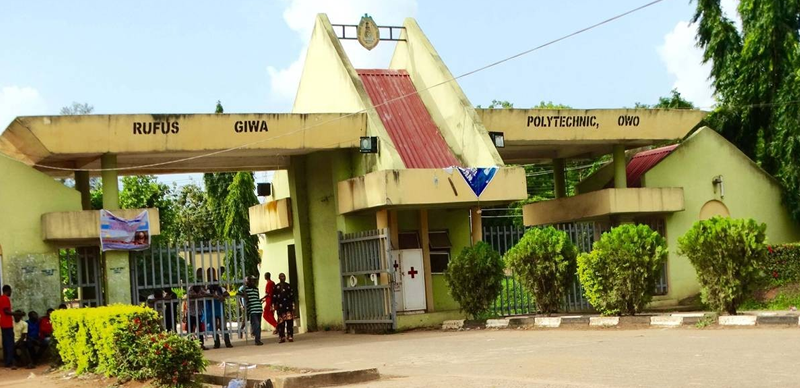The Rufus Giwa Polytechnic (RUGIPO) in Owo, Ondo State, has been plunged into a state of unrest as workers commenced an indefinite strike on Tuesday, October 24, 2025. The strike action, spearheaded by the Non-Academic Staff Union (NASU) and the Senior Staff Association of Nigeria Polytechnics (SSANIP), stems from the non-payment of six months’ salaries and the state government’s failure to implement the national minimum wage. Workers took to the institution’s campus in a peaceful demonstration, brandishing placards that vividly depicted their plight. Messages like “We are hungry, pay our six months’ salaries,” “Mr Governor, please implement our 2025 budget,” and “Acting Rector, please clear our 2022, 2023, and 2024 promotion arrears” underscored the depth of their grievances and the multifaceted nature of their demands. The strike action threatens to disrupt the academic calendar and further destabilize the institution if the government fails to address the workers’ concerns promptly.
The protest, a culmination of mounting frustration and hardship, brought to the fore the dire financial circumstances faced by the polytechnic staff. Union leaders, Mr. Julius Olugbenga-Aro of NASU and Mr. Saka Olokungboye of SSANIP, articulated the workers’ demands, calling on Governor Lucky Aiyedatiwa for immediate intervention. They highlighted the debilitating impact of unpaid salaries on their members’ ability to meet basic needs, emphasizing the urgency of the situation. The union leaders acknowledged some positive steps taken by the governor, such as the recent approval for the polytechnic’s conversion to a university. However, they underscored the pressing need for more immediate action on the salary arrears and minimum wage implementation, stressing that these issues directly affect the well-being of their members and the smooth functioning of the institution.
The non-payment of six months’ salaries has placed a significant financial strain on the workers, making it difficult for them to afford basic necessities. The delay in implementing the national minimum wage further exacerbates their financial struggles, leaving them feeling undervalued and demoralized. The union leaders argued that the prolonged non-payment of salaries and the lack of minimum wage implementation demonstrate a disregard for the workers’ welfare and their contributions to the institution. They warned that the continued neglect of their demands could lead to a protracted strike, further disrupting academic activities and jeopardizing the future of the polytechnic.
The workers’ demands extend beyond salary payments and minimum wage implementation. They are also seeking the implementation of the 2025 institutional budget, which they believe is crucial for the effective running of the polytechnic and the provision of quality education. Furthermore, they are requesting the clearance of promotion arrears for 2022, 2023, and 2024, which represent a significant financial entitlement for the affected staff members. The accumulation of these unmet demands paints a picture of systemic neglect and financial mismanagement, further fueling the workers’ discontent and their resolve to continue the strike until their grievances are addressed.
The union leaders, while appreciative of the governor’s efforts in securing the polytechnic’s upgrade to a university, emphasized that the immediate well-being of the staff is paramount. They argue that a well-funded and properly staffed institution is essential for a successful transition to university status. The failure to address the current financial challenges faced by the workers could undermine the future of the newly approved university, making it difficult to attract and retain qualified staff. They appealed to the governor to prioritize the welfare of the workers and ensure the smooth running of the institution by addressing their demands without further delay.
The indefinite strike at RUGIPO underscores the critical importance of addressing workers’ welfare and ensuring timely payment of salaries. The situation also highlights the need for effective communication and engagement between the government, the institution’s management, and the unions to prevent such disruptions. The future of the polytechnic, now on the cusp of becoming a university, hinges on the swift resolution of this crisis. A prolonged strike could not only disrupt academic activities but also damage the institution’s reputation and hinder its ability to attract and retain both students and staff. The onus is now on the Ondo State Government to address the workers’ legitimate concerns and ensure the smooth transition of the polytechnic to a fully functioning university.














